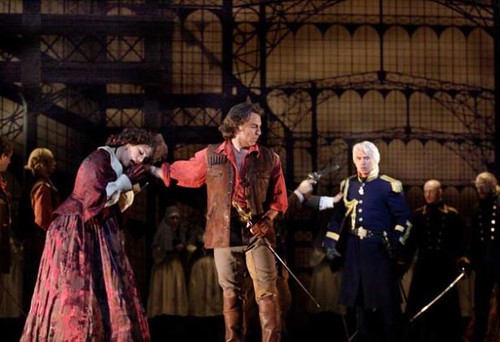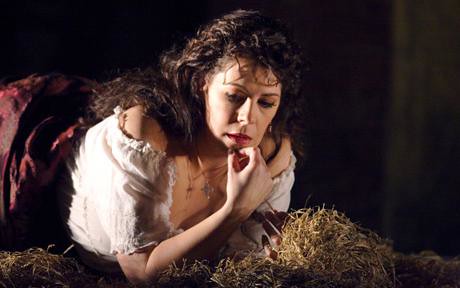Azucena, the weird gypsy who can't remember which baby she threw on the fire while trying to avenge her mother - this is an opera about maternal multitasking; no wonder she got in a muddle - was securely sung by Malgorzata Walewska. Alagna opted for a short, wobbly top B in "Di quella pira", rather than the showier C favoured anachronistically (Verdi didn't write it) by many tenors.
It's always said that Il trovatore needs four great principals. This production had three good ones and, in Hvorostovsky, one who went further, exploring the complexity of the role through beautiful singing. Yes, the Count is an obsessed, jealous brute, but he loves Leonora. His agony is real. His heartfelt arias tell us so. Verdi might have picked a stinker of a libretto, but he knew his music would make all blindingly clear.»

(Radvanovsky, Alagna e Hvorostovsky em Il Trovatore)
«Although Eljiah Moshinsky’s nine-year-old production continues to look very handsome, using Visconti’s Risorgimento movie Senso as a point of visual reference, it’s too feebly polite in dealing with a scenario of death-defying love and murderous revenge. Where was the physical energy and emotional turmoil which should blaze out of one of Verdi’s most visceral operas?
The cast provided those qualities only sporadically. The audience was thrilled by the American soprano Sondra Radvanovsky, singing Leonora for the first time in London. Her first aria found her large, grainy and vibrant soprano under less than perfect control and Verdi’s delicately arched phrases painted with a broad brush, but she improved as the evening progressed and presented the opera’s last two scenes in the grand style. More attention to words and cleaner vocal attack would make her a mature artist.
Robert Alagna was also new to London as her troubador suitor Manrico. For most of the evening he sang at a relentless, mindless forte, appearing as disengaged from the drama as he was from Verdian sensibility: one felt he was in a sulk and couldn’t have cared less. “Ah, si ben mio” was utterly charmless, but after he’d jumped the hurdle of “Di quella pira” with bravado, he began to sing with more finesse. Alagna has tremendous raw talent, and it’s something of a mystery as to why he doesn’t use it better.
Dmitri Hvorostovsky repeated his elegantly polished Conte di Luna. Polish mezzo Malgorzata Walewska doesn’t command the depth and weight necessary for the role of Azucena, and her intonation was erratic. Russian bass Mikhail Petrenko dramatised Ferrando’s narration vividly. The chorus sang heartily.»

(Sondra Radvanovsky como Leonora, em Il Trovatore)
«The latest revival of Elijah Moshinsky's 2002 production of Verdi's Il Trovatore forms a vehicle for Roberto Alagna and Dmitri Hvorostovsky as Manrico and Di Luna respectively. It has its faults, but its stars work uncommonly well together as the tragic brothers, separated in infancy and now, ignorant of each others' identities, implacable enemies in love and in a mindless civil war.
Both have genuine charisma, which helps. What's really striking, however, is the sense that each possesses the qualities the other lacks. Alagna has exceptional athletic grace and sings with a tone that is lived-in and sometimes a bit raw. Hvorostovsky, his movements constricted by the succession of military uniforms that epitomise the man's rigidity, is stiff-backed and aristocratic but voices Di Luna's arias with incomparable refinement and beauty.
They are entirely credible as subconsciously linked alter-egos. When Manrico says something indefinable has always prevented him from killing Di Luna, his words make perfect sense. Moshinsky has also cannily changed the ending: rather than ordering Manrico's execution by firing squad, Di Luna stabs him in a fit of blind rage, then cradles his body as the truth is finally revealed.»
«Pint-sized Roberto Alagna – looking for all the world like a freedom fighting Peter Pan – covered a lot of ground rushing up and down stage to little purpose other than to suggest his readiness for heroics, and still had enough puff left to manage – but only just – the top Cs of “Di quella pira” (the second of them being decidedly flat). But the “squillo” quality that has developed in his voice gives him the vengeful vocal edge, the roughness, that the role of Manrico requires and he still sings with an authentic Italianate ardour.
In marked contrast, his rival in love (and unbeknownst to him, his brother), Dmitri Hvorostovsky (Count di Luna) is all about elegance and line. His act two romance truly showed his superior class with breath after eternal breath tracing out those Verdi legatos as if somehow they were mysteriously created in the singing of them.
So much for the testosterone.»
A reprise do Il Trovatore (Verdi) em cena no Royal Opera House – cuja estreia remonta a 2002 -, na opinião da imprensa britânica, suscita críticas unânimes: encenação cosi – cosi (pretender recriar o ambiente mágico de Senso é, no mínimo, megalómano!), senhoras entre o bom e o mediano e homens em plena forma.
Alagna não é o Manrico ideal, todos o sabemos. A sua interpretação do papel não deixa saudades. Mas haverá, na actualidade, melhor escolha? Cura é um pavão sem pio e Licitra só a custo sai da indiferença…
Este último, tivemos ocasião de o apreciar no derradeiro Il Trovatore de Lisboa, ainda na saudosa Era Pinamonti. Um O Trovador de excepção, com uma Leonora estrondosa (Katia Pellegrini), um Conde - Agachu (ainda) digníssimo e um Licitra… jeitosito, sem mais.
Hvorostovsky é, apenas e só, o melhor conde desde o ocaso de Cappuccilli. Sem surpresa, triunfou!
Quanto às damas… custa-me a crer que Radvanovsky apenas se tenha "aguentado"! Curiosamente, na citada produção da mesma ópera de Verdi, no São Carlos, era a Leonora prevista. Tem triunfado por todo o mundo como soprano verdiano…
Como se diz algures, apesar de este Il Trovatore não reunir as quatro melhores vozes do mundo, conta – seguramente – com três dos mais habilitados intérpretes contemporâneos.
Tivéssemos nós a sorte dos londrinos...
8 comentários:
João,
Tem a certeza que a segunda fotografia representa a personagem Leonora ? Não acha que no meio daquela palha não tem muito mais a ver com a Azucena? Não sei, talvez eu esteja errado, mas parece-me mais lógico.
Raul,
Yep... faz sentido ;-) Muito mais sentido!
Adorei a forma como o autor do artigo escreveu sobre o absurdo da troca de bébés! :)
Gotta love the british press!
A sra. Walewska foi a que cantou a Maddalena do Rigoletto no São Carlos na temporada passada, não foi?
NAO SEI...
Está confirmado.
Caro Dissoluto,
Achou O Trovador de 2002 no S. Carlos, de excepção??... eu pelo contrário, achei uma valente e medíocre bodega!!! Saí de lá tão desiludidinho com a Ópera em Portugal… que nem lhe conto… :-P !!!
Estava numa das 1ª.s filas do Teatro (como nunca estive… até recentemente ao RING Graham Vick) e afligiu-me estar tão perto do palco, ver ali os cantores PERTÍSSIMO de mim, que não me transmitiam PATAVINA dramático-teatral nenhuma,naquele dramalhão Verdiano-Trovadoresco que tanto gosto e adoro!... :-)
…É estranho!... passa-se comigo exactamente o contrário com o Ring-Graham Vick. Quero estar ali na primeira fila da Plateia, numa perspectiva BEM DIFERENTE! Ver e ouvir as Valquírias a cantar atrás de mim, a aparecerem dos lados, Alberich a pular de um camarote, Siegfried e Brunnhilde ali dentro da tenda e nós a tentar espiar lá para dentro, Hagen a olhar cego para o Anel e, ao mesmo tempo, a conduzir a sua máquina empilhadora… esta visão Vickiana inspira… Esse Trovador de 2002 não me inspirou!... Nada!
Também lamento desiludi-lo, mas não achei nada de especial à Leonora de Katia Pellegrino ( o seu nome correcto, segundo o programa da Récita, que tenho aqui ao lado). Que é feito dela, já agora?... :-?
A última soprano verdiana que lá esteve, segundo a minha opinião (e audição!...) e mesmo assim… assim, assim… foi Aprile Millo no UN BALLO de 2000.
Concordo plenamende consigo quanto a Alexandru Agache e a Salvatore Licitra.
Quem mais me impressionou do elenco apresentado foi Alexandru Agache como di Luna e, principalmente, a Azucena de Tea Demurishvili, meio-soprano nascida na Geórgia. Que é feito dela, já agora?... :-))
All the best, everybody
LG
A Katia Pellegrino desapareceu. Achei-a competente no Trovador sem ser extraordinária. Parece que era praticamente uma estreante e durante dois ou três anos, ou talvez menos!, cantou muito em Italia e depois desapareceu e percebe-se porquê porque quando por cá voltou a aparecer já estava muito degradada.
Enviar um comentário